Sahiyo releases new research report on February 6th
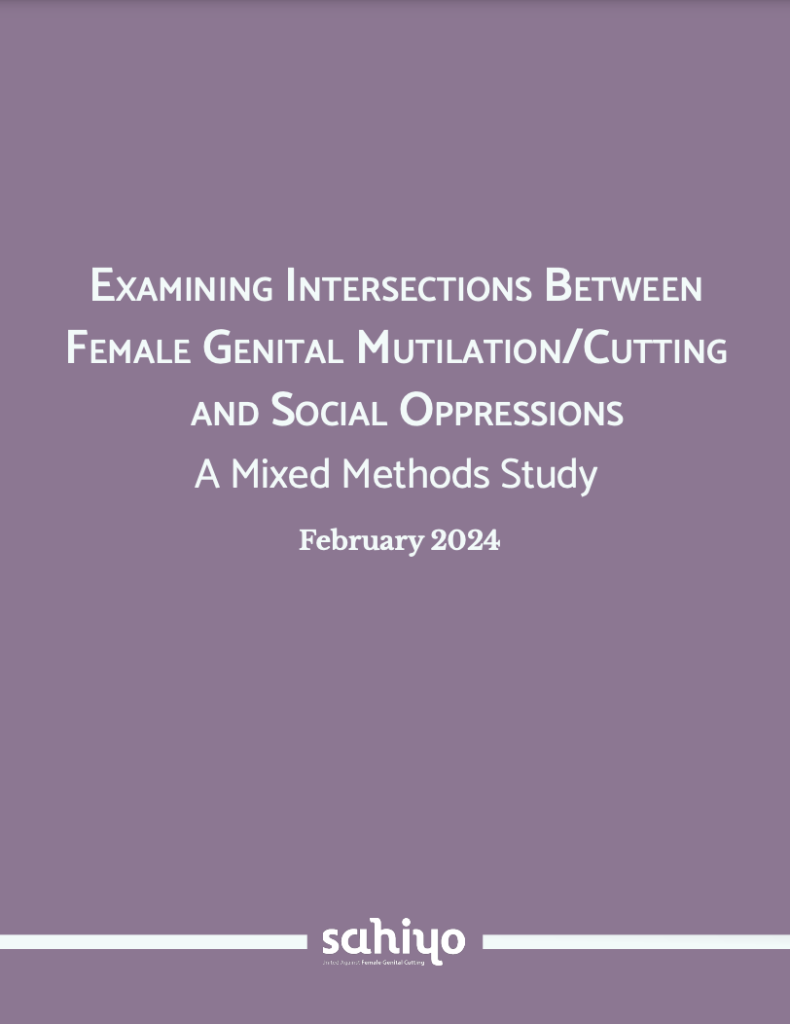
Sahiyo U.S. is excited to announce the publication of Examining Intersections Between Female Genital Mutilation/Cutting And Social Oppressions: A Mixed Methods Study, the second of three reports from our Critical Intersections Research Project. Inspired by our 2021 webinar, and building upon themes derived from our initial body of work released in 2023, this new report is based on original research from a mixed-methods survey with over 100 respondents, including individuals and organization that work within and beyond the FGM/C sphere. We are proud to share this report on February 6th, International Day of Zero Tolerance for FGM/C, as part of our survivor and advocate-led original research project. The report examines two main forms of oppressions intersecting with FGM/C: systemic forces, including discrimination within institutions, as well as interpersonal and communcal factors, such as discrimination within practicing communities and the anti-FGM/C movement itself. This body of work also identifies challenges and opportunities for cross-collaboration with other social justice movements and provides recommendations for how to implement this intersectional work. This research is meant to support advocates working in FGM/C to better understand how these intersecting oppressions affect the movement to end FGM/C, and connect fellow activists and social change makers to understand the larger forms of inequity at play and unite in ending these universally oppressive systems. We aim to strengthen anti-FGM/C efforts by addressing the roots of inequity and inequality and to create stronger collaborative movements across various human rights issues. Read the report here. Learn more about the Critical Intersections Research Project here.
Sahiyo publishes second report from Critical Intersections Research Project

Sahiyo U.S. is excited to announce the publication of Examining Intersections Between Female Genital Mutilation/Cutting And Social Oppressions: A Mixed Methods Study, the second of three reports from our Critical Intersections Research Project. Inspired by our 2021 webinar, and building upon themes derived from our initial body of work released in 2023, this new report is based on original research from a mixed-methods survey with over 100 respondents, including individuals and organization working within and beyond the FGM/C sphere. We are proud to publish this report, as part of a survivor and advocate-led original research project, on February 6th, International Day of Zero Tolerance for FGM/C. The report examines two main forms of oppressions intersecting with FGM/C: Systemic forces, such as discrimination within systems and institutions, included intersections between several forms of oppression such as xenophobia and racism with institutions like law enforcement. Many survey participants identified fear of the criminal justice system as a challenge for survivors and the end FGM/C movement; interestingly, a majority of every group reported to work with the legal system and law enforcement (in and beyond the FGM/C sphere). Interpersonal and communal forces, such as discrimination from within practicing communities and the movement to end FGM/C, introduced complexities for survivors and activists alike. Interestingly, individuals working in the FGM/C sphere most commonly identified interpersonal challenges (rather than systemic forces) such as gender discrimination and other forms of gender-based violence as challenges that girls and women in FGM/C-practicing communities face. Additonally, a strong discord around the framing of FGM/C (‘mutilation’ vs. ‘cutting’) suggested a significant barrier to collaborating within the FGM/C sphere and beyond. Lastly, the study examined the potential for cross-collaboration between the anti-FGM/C sphere and other social justice movements. Though participants reported an overwhelming desire for cross-collaboration across the demographic groups, they also identified many significant challenges for meaningful cross-collaboration. Participants also provided opportunities for collaboration. From the various challenges, opportunities, and intersections of oppressions, eight recommendations for cross-sector collaboration and intersectional work involving how to work toward ending FGM/C were gathered. This research is meant to support advocates working in FGM/C to better understand how these intersecting oppressions affect the movement to end FGM/C, and connect fellow activists and social change makers to understand the larger forms of inequity at play and unite in ending these universally oppressive systems. We aim to strengthen anti-FGM/C efforts by addressing the roots of inequity and inequality and creating stronger collaborative movements across various human rights issues. A special thank you to the Wallace Global Fund for funding this project! Read the full report here.
Presenting the Critical Intersections Research Project to The Girl Generation
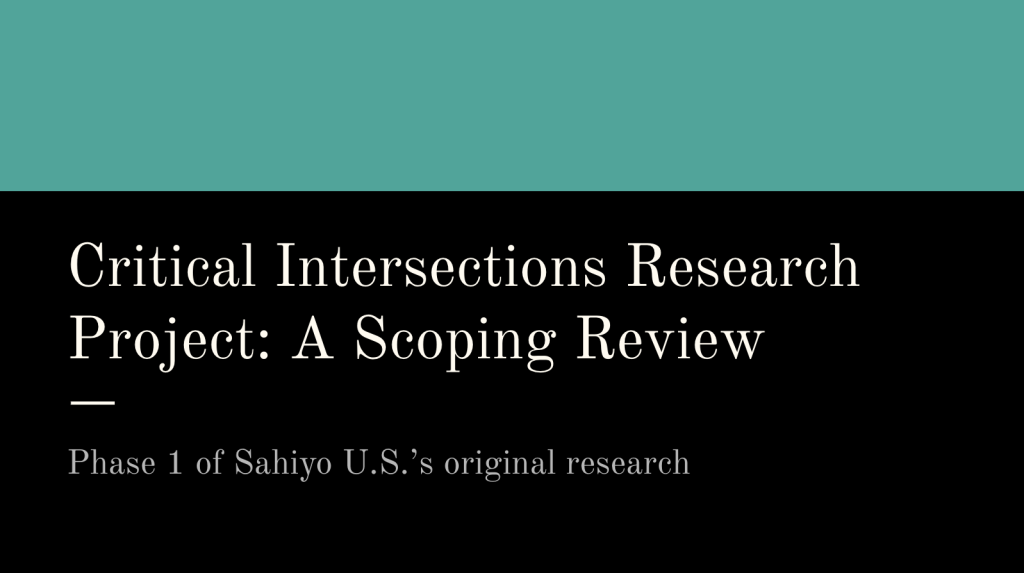
On November 21st, Sahiyo’s Research Coordinator, Rachel Wine, and Training and Technical Assistance Coordinator, Aries Nuño, presented findings from the first stage of Sahiyo’s Critical Intersections Research Project to The Girl Generation. The findings, published in the Examining the Current State of Critical Intersections: Female Genital Mutilation/Cutting and Social Oppressions report in October, were derived from a scoping review on the topic of intersectionality. More specifically, this report explores connections between the anti-female genital mutilation/cutting (FGM/C) sphere and other social justice movements, as well as the complex identities of survivors and activists, through an array of literature such as peer-reviewed literature, editorials, opinion pieces, reviews, and social media communications. The presentation shared background information on the Critical Intersections Research Project, tracing its roots back to Sahiyo’s 2021 public webinar titled Critical Intersections: Anti-Racism and Female Genital Cutting (FGC). Additionally, the presentationexplored the seven core themes derived from our scoping review: Religion, Race, Bodily Autonomy, Queer Gender & Sexuality, Feminism, Law & Policy, and Climate Change, highlighting how they intersect with FGM/C. Lastly, Aries and Rachel detailed the next steps for the project, including the publication of two reports on original mixed-methods research, expected in 2024. The Sahiyo team was thrilled to be met with questions from The Girl Generation about the various core themes derived from the research, as well as some findings to be shared in the upcoming reports. Many thanks to Esmael Omar for helping make this opportunity a reality! If you or your organization are interested in hosting a presentation on Sahiyo’s Critical Intersections Research Project, please contact rachel@sahiyo.org and aries@sahiyo.org for more information.
PRESS RELEASE: Sahiyo publishes Examining the Current State of Critical Intersections: Female Genital Mutilation/Cutting and Social Oppressions report
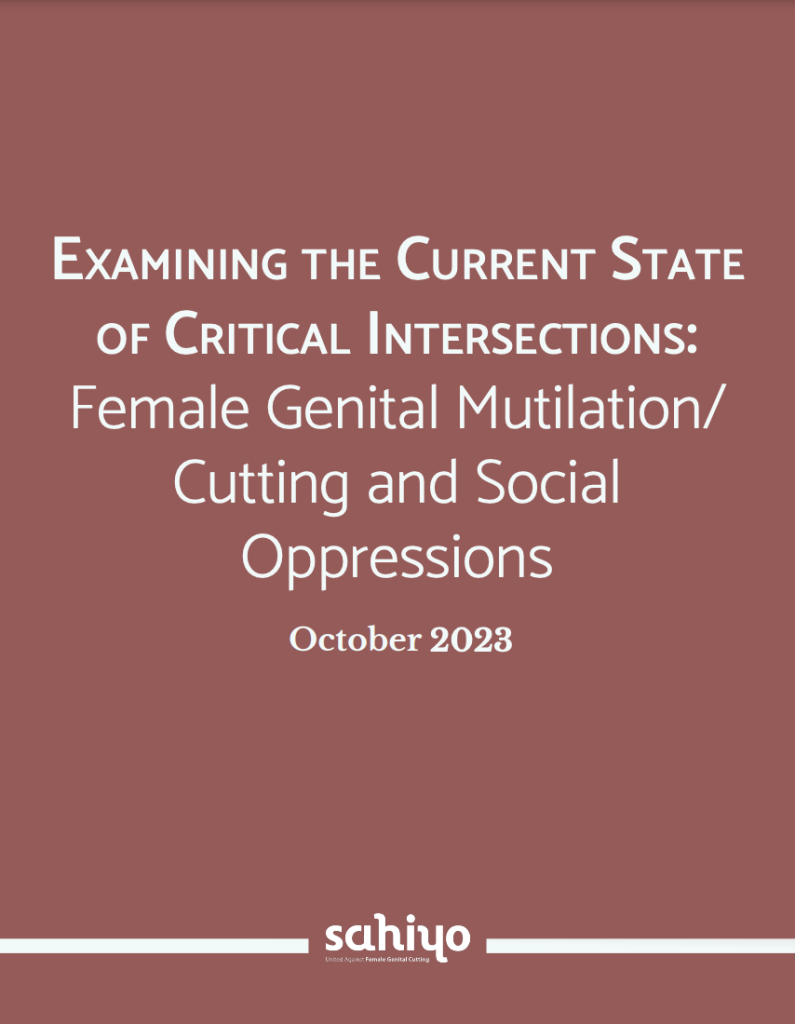
Sahiyo U.S. is proud to announce the publication of our new report, Examining the Current State of Critical Intersections: Female Genital Mutilation/Cutting and Social Oppressions. The report explores how different forms of oppression intersect to affect survivors’ access to resources, as well as how the work to end FGM/C is connected to other social justice movements. The inspiration for the report sprung from a webinar that Sahiyo U.S. hosted in July of 2021 titled, “Critical Intersections: Anti-Racism and Female Genital Mutilation/Cutting (FGM/C).” This discussion highlighted how systemic racism negatively affects the work to end FGM/C. The webinar was highly successful, engaging more than 300 people. Using that momentum, with funding from Wallace Global Fund, Sahiyo U.S. launched a research project to further understand how different forms of oppression affect marginalized communities that practice FGM/C, and how to connect with other social justice movements to strengthen efforts in ending FGM/C. The report breaks down how the following themes, and how they intersect with the harmful practice of FGM/C: Religion: FGM/C occurs within many different religious communities, yet a focus on Islamic communities falsely correlates the practice with this religion, negatively impacting women and survivors of FGM/C with an Islamic background and furtherheightening Islamaphobia. Race: common assumptions about FGM/C are often based on racist stereotypes. Type III FGM/C (infibulation) is often called “African FGM/C,” while less severe types of FGM/C such as Type I (clitoridectomy) and Type II (excision) are associated with Asian countries. This racialized distinction can be used to justify the practice by some FGM/C practicing communities Bodily Autonomy: there is great potential for collaboration between anti-FGM/C work and the #MeToo movement. Violations of survivors’ bodies at an age where they do not fully understand how their body functions inhibits their ability to assert bodily autonomy; similarly, survivors of the #MeToo movement lost autonomy over their bodies through experiences of sexual violation. Queer Gender and Sexuality: the practice of FGM/C itself forces survivors to comform to cisgender and heteronormative ideas of what a woman is. LGBTQ+ survivors are underrepresented in statistics and the FGM/C activist community, and face an intersection of barriers that causes erasure from the FGM/C sphere. Feminism: there are many complexities at the intersection of FGM/C and feminism. Both the resister and accommodator of FGM/C may argue that their actions are aligned with Feminist philosophy based on their reasoning. Law and Policy: In the U.S., state laws on FGM/C have been co-opted to ban gender-affirming healthcare for minors. Globally speaking, law and policy has led to the criminalization of FGM/C, creating opportunities for ending of the practice, or giving practitioners reason to continue it in secrecy. Climate Change: marginalized groups are more adversely affected by the climate crisis because they do not have economic resources to protect themselves. This puts financial strain on these communities, and makes women and girls more susceptible to oppression and violence, including FGM/C. It is our hope that this report will support advocates working in FGM/C to better understand how these intersecting oppressions affect the work to end FGM/C and survivors, and connect fellow activists and social change makers to unite in ending universally oppressive systems. Read the full report here. Learn more about the Critical Intersections Research Project.
Research Study on Clitoral Reconstructive Surgery in Canada

A research study titled Clitoral Reconstructive Surgery in Canada is currently looking for interview participants who are survivors of female genital cutting and have undergone clitoral reconstructive surgery and/or those who have not yet undergone this procedure but are interested in doing so. Active recruitment for this study will remain open until May 2024. Who is this study for? Survivors interested in clitoral reconstructive surgery Survivors who have been referred for clitoral reconstructive surgery Survivors who have previously undergone clitoral reconstructive surgery What are the goals of this study? To develop a greater understanding of survivor’s interests, motivations, and/or expectations in electing to undergo clitoral reconstructive surgery To identify how well survivor’s surgical outcomes meet their initial expectations To improve the referral process for survivors who wish to undergo clitoral reconstructive surgery To highlight the importance of quality care for survivors of FGM/C All interviews will be strictly confidential. To learn more about this study and how to participate, please contact the principal investigator, Kiah Leone, from the School of Health Sciences at the University of Northern British Columbia (UNBC) by email at leone@unbc.ca.
Exploring Canadian physicians’ experiences providing FGC-related care
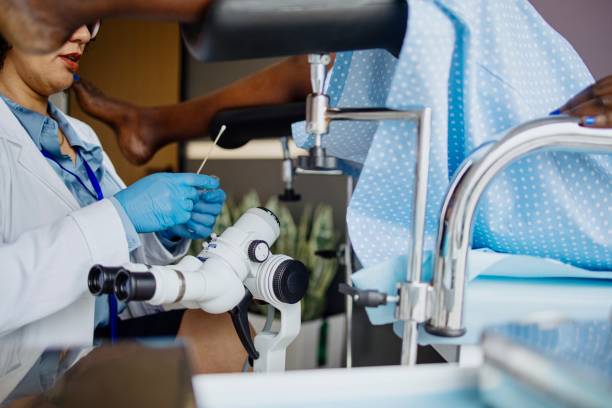
By Kiah Leone As countries like the United States, Canada, Australia, and others become increasingly aware of the practice of female genital cutting (FGC) and its presence in their country, their healthcare systems are having to explore what support and quality services for survivors of FGC entail. Medical studies conducted across many of these countries have identified a significant lack of knowledge on behalf of healthcare workers when it comes to the practice of FGC. This lack of understanding regarding the practice, particularly the various sociocultural contexts within which it is perpetuated, can often leave survivors confronted with a healthcare system ill equipped to meet their particular needs. Unfortunately, instances of discrimination and stigmatization are not uncommon as a result, and such instances may cause survivors to feel discomfort, judgement, embarrassment, and fear in medical contexts, or to avoid seeking medical help and attention altogether. As part of my graduate degree in Social Anthropology, I decided to investigate the experiences of medical professionals in Canada as they navigated appropriate and culturally competent care for survivors. In 2018, I conducted a qualitative study with interviews of Canadian physicians and health care providers who had provided reproductive health care to survivors in Canada. The purpose of this study was not only to gain a deeper understanding of the role of physicians and medical personnel in providing reproductive health care to survivors of FGC, but to also learn how FGC was thought about, both within the Canadian healthcare system and in Canada as a whole. Interviews with medical professionals consisted of a series of questions regarding their level of education and training, experiences providing reproductive health care, knowledge of FGC and how they first came to learn about it, as well as their experiences providing care specifically for survivors. From these interviews, four major themes emerged: a lack of education and training amongst health care personnel in regards to FGC; reliance upon repeated encounters with survivors in order to develop a form of expertise in FGC-related care; a desire amongst participants to educate past, present, and future health care professionals on the practice of FGC; and the belief that FGC is an important topic of concern for reproductive health care specialists in Canada. What stood out across each of these themes was an emphasis on the importance of understanding FGC, rather than just learning how to accommodate survivors within a medical context. The physicians and health care providers who participated in my study all recognized the value and importance of education, training, and mentorship in the medical and health care concerning FGC in Canada. Providers explored the benefits of education and training, not only for their current and future medical students and residents, but also for their colleagues and peers to account for the diverse needs of their patients. From this study, I concluded that by continuing their own learning, making recommendations, and implementing education initiatives that provide early learning opportunities for others, Canadian health care professionals can improve the quality of care that survivors receive here in Canada. Kiah Leone (she/her) is a Doctoral Candidate in the School of Health Sciences and an Instructor for the Department of Anthropology at the University of Northern British Columbia (UNBC). Kiah’s research interests focus on improving female genital cutting (FGC) survivors’ experiences in accessing quality health care in Canada. She received her MA in Social Anthropology from York University and her BA in Anthropology from Vancouver Island University. Kiah is currently undertaking a study on the introduction of clitoral reconstructive surgery in Canada.
Female Genital Mutilation/Cutting (FGM/C): A survey of knowledge, attitudes, and practices of health care professionals in urban/ rural India

Female genital mutilation/cutting (FGM/C) has been performed on an estimated 200 million women and girls worldwide. Health care professionals play a significant role in the prevention of FGM/C. They can support and educate patients and communities about the advantages of ending the practice. However, health care professionals (HCPs) frequently lack the resources and education required to carry out these crucial duties. Until February 28th, 2023, a team of researchers from India is conducting a survey among health care professionals regarding their knowledge, attitudes, and practices (KAP) about FGM/C. Who is this survey for? Doctors (MBBS or postgraduate including AYUSH), nurses, and midwives practicing in urban/rural India. Our goals for this survey: to assess the KAP of health care providers; to establish a baseline for further research in India; to help facilitate the creation of efficient plans, policies, and targeted training initiatives on how to deal with FGM survivors (medically and psychologically) in the future for HCPs; to create awareness among health care workers in India. Any health care professional who is eligible according to the criteria can provide their insights about FGM/C by filling out this survey. It consists of roughly 30 questions which should take approximately 5 minutes to complete. Who can you reach out to? If you have any queries, feel free to contact the researchers at: alifya104@gmail.com or saadkazi5484@gmail.com.
Research: The impact of integrating FGM/C within domestic violence support services

Why are Indian ethics committees still hesitant to approve studies on FGM/C?
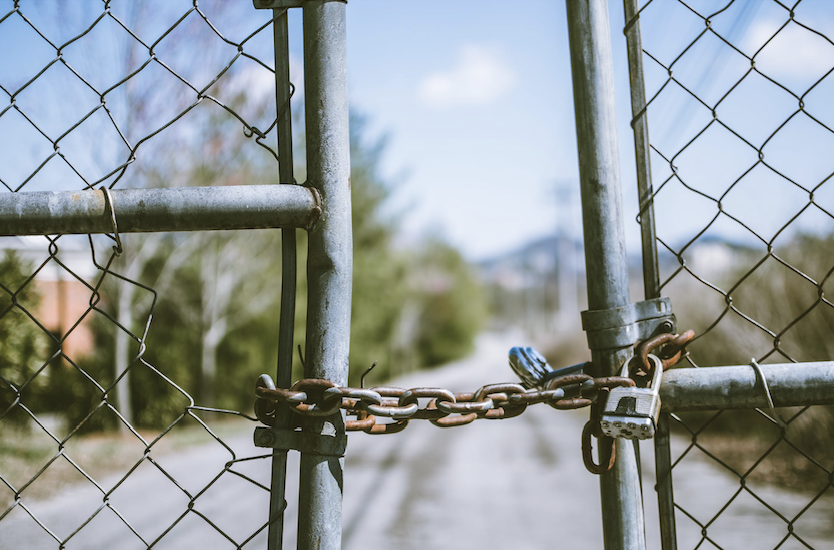
By Dr. Alifya In the past year, while making arduous efforts to obtain ethical approval for my research, I have come to understand the answer I was continuously receiving. “No.” My colleague and I, both doctors, sought out to survey Indian healthcare workers on their knowledge, attitudes, and practices about female genital mutilation or cutting (FGM/C). This simple cross-sectional study involved a questionnaire being sent out to Indian healthcare professionals via Google forms. It did not involve speaking to FGM/C survivors or providing any type of intervention; it simply served as a survey-based study to understand what Indian healthcare workers already knew or didn’t know about FGM/C. However, in trying to obtain ethical approval, we encountered unanticipated challenges. Being a healthcare worker and a survivor of FGM/C, I was searching for ways I could contribute to ending this practice. In our curriculum, there was not even a single mention of FGM/C. If a healthcare practitioner is unaware about the problem, how can they treat and assist? Healthcare professionals play a significant role in the prevention of FGM/C and can support and educate patients and communities about the advantages of ending the practice. Since very little research has been done in India on this topic thus far, I believed this would be a good starting point to pave the way for more research on FGM/C. Data from this research would also help create further awareness among healthcare workers. My colleague and I enthusiastically approached my father’s acquaintance, a gynecologist, with this idea. However, he attempted to dissuade us instead of guiding us. He claimed no one would discuss this subject; “Why not try something less contentious and simple?” Though discouraged, we weren’t prepared to give up. Next, we approached several committees in Mumbai for ethical clearance, including the ethics committee of our respective places of employment. However, no one responded. We eventually changed our jobs and approached these new institutes as well. Unfortunately, we got a similar response. “The topic is too sensitive. Try something simple.” Our research which started in Mumbai turned out to be extremely challenging. We met many people who loved the idea and were ready to guide us and be a participant in the research. However, they were not ready to publicly attach their or their institute’s name to it. After so many unsuccessful attempts, we decided to approach our parent institute, from where we graduated, in a small town in Maharashtra. Not many were aware of the practice. Despite this, we talked to our professors, and they were happy to assist us. The head of the ethics committee was eager to help us out as well, until she sat down and read our proposal. To our dismay, she echoed what we had been hearing for so long. “This topic is too sensitive. We cannot attach our institute’s name to it.” We have approached several committees over the past year and met with people who discouraged us, scared us, or pushed us into doing something else. But we are not giving up yet. We have emailed several independent committees all over India and are waiting for a response. Hopefully, someone will be able to help us. This journey has been challenging and difficult, but it has given us courage to keep finding new ways and not to give up. On our journey, we met a lot of new, encouraging, and supportive people. We are hopeful that some years down the line, the current situation will change. Becoming involved in this research and working to make changes has helped me emotionally deal with having had FGM/C. September 28, 2022 Update: I’m really happy to share the wonderful news that, finally, a Hyderabad-based independent committee has given its approval to our research. We found this independent committee through a business named Quinary Research Pvt Ltd. Though they had certain reservations, such as not including religion and naming Bohras as a practicing community, they were not as opposed to our research topic because we only included healthcare professionals and utilized a standardized World Health Organization (WHO) questionnaire. The fact that this independent committee lacked knowledge about the practice of FGM/C, and that it occured in India, is the major reason we believe they were willing to let us conduct the research; this lack of knowledge only goes to show how crucial conducting this study on healthcare providers’ knowledge on FGM/C is. We still have a lot of work ahead of us, but we have a start. Sahiyo has agreed to assist us with our project by providing funds and advice. We are grateful beyond words for Sahiyo’s unwavering support and encouragement in our work to end FGM/C.
How to have a dialogue: Storytelling & Conversations

By Huda Syyed It took me a while to realise that research isn’t just about crunching numbers and gathering quantitative data. When dealing with issues such as female genital cutting (FGC), human interaction and communication can play a more important role than numbers; to open up and speak about one’s experience of FGC requires a high level of trust and safety. It is important to create a safe and trusting place for those who have survived FGC and are sharing their stories. I think this is why it’s best to let survivors narrate their own stories and navigate conversation at their own pace. In my short experience as a researcher, I learnt how important it is to have conversations that relay the stories and backgrounds of people. Without understanding the stories of people, it is impossible to collect qualitative data about culture and communities. Interviewing research participants also has an element similar to storytelling because people can share details about their background, an event or even a practice. Consent and comfort are primary indicators of whether or not a person is willing to share their thoughts, and I think it is important to acknowledge these indicators before starting a conversation to ensure that there is an ethicality to storytelling. Any hints of discomfort and hesitation on the part of the survivor should be taken seriously to make sure that re-traumatization does not occur. The well-being and readiness of people should be of utmost priority to researchers, because true storytelling does not come from a place of coercion or reluctance. Storytelling is an effective way to open dialogue or start a conversation about FGC. Voices to End FGM/C, a collaboration between Sahiyo and StoryCenter, is an example of survivors sharing their experiences to create more awareness, understanding, and public dialogue about the practice, with a prioritized sense of agency in creating their own story. What began with Sahiyo co-founder Mariya Taher sharing her own story and encouraging other women in the United States to come forward with their stories has had a ripple effect, and we continue to see Sahiyo engaging in extensive dialogues. Other Sahiyo programs like Bhaiyo were created to include men in this necessary dialogue, as well as “to provide love, support, and community towards the advocates and survivors working to end FGC.” Something that started off among women has grown into a larger platform where friends, fathers, brothers and husbands are coming forward to end FGC together. The biggest takeaway from this is how storytelling and conversations created a domino effect and led to more people learning and talking about FGC. From a research perspective, storytelling and conversations can lead to more data, which helps us understand the practice and its impact. My research focuses on Pakistan, where there is very little data and no public record of FGC, thus creating a huge research gap yet to be explored. I think storytelling and conversations could be the start of creating more awareness and understanding of FGC in Pakistan. Since any topic that deals with female genitalia or sexuality is seen as shameful in Pakistani society, it may take a while for people to engage in open dialogue about FGC. Due to cultural and religious connotations, people are hesitant about discussing such topics because they are considered inappropriate. Patriarchal undertones within Pakistani society frame women’s bodies as non-autonomous and often under the surveillance or submission to the male figure. Honour killings and other gender-based violence crimes take place under the notion that women’s bodies carry the honour of husbands, brothers or fathers. These assumptions about women and their bodies probably adds to the invisibility or lack of dialogue regarding female genital cutting (FGC). It is not uncommon to find qualitative researchers exploring topics of gender-based violence and women’s rights through stories and narratives. It gives social scientists a deeper insight into how culture, gender, and society work. In such cases, I don’t think quantitative data can capture people’s experiences or the cultural or religious attributes attached to them. Storytelling and conversations give researchers the space to gather data as listeners or bystanders, while allowing the story-teller/interviewee/conversationalist to share details on their own terms. I will end my thoughts on this note: “If story is central to human meaning why, in the world, is there not more storytelling?”
